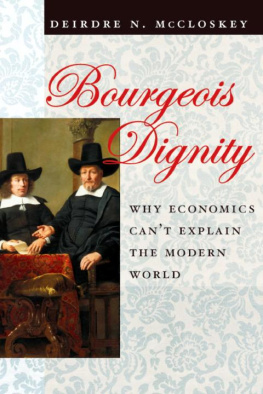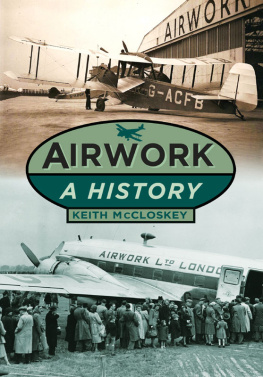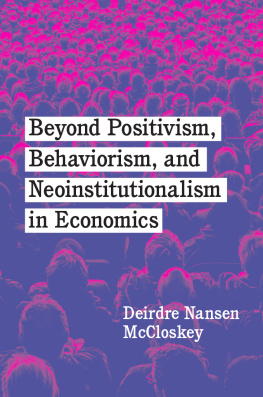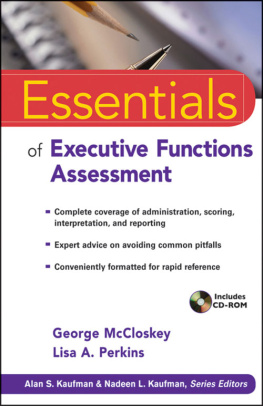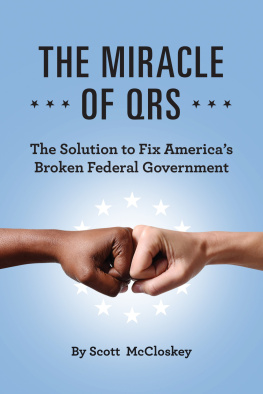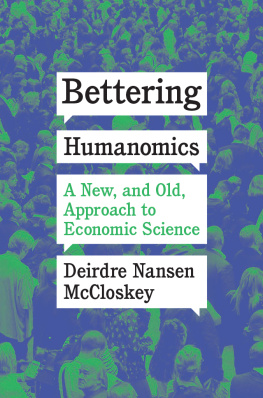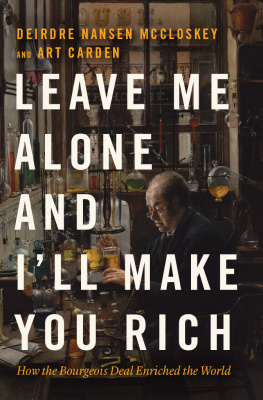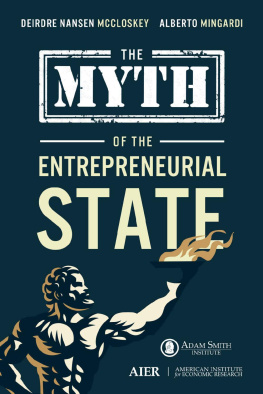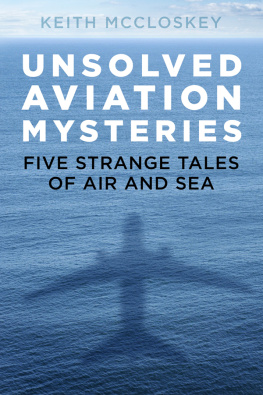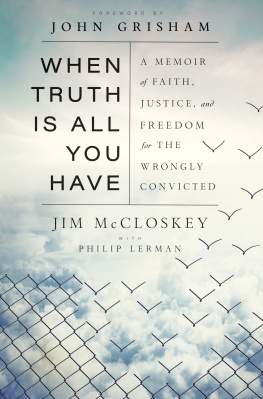Bourgeois Equality
How Ideas, Not Capital or Institutions, Enriched the World
DEIRDRE NANSEN MCCLOSKEY
THE UNIVERSITY OF CHICAGO PRESS
CHICAGO AND LONDON
D EIRDRE M C C LOSKEY is distinguished professor of economics, history, English, and communications at the University of Illinois at Chicago and the author of sixteen books, including The Bourgeois Virtues, Bourgeois Dignity, and Crossing: A Memoir.
The University of Chicago Press, Chicago 60637
The University of Chicago Press, Ltd., London
2016 by The University of Chicago
All rights reserved. Published 2016.
Printed in the United States of America
25 24 23 22 21 20 19 18 17 16 1 2 3 4 5
ISBN-13: 978-0-226-33399-1 (cloth)
ISBN-13: 978-0-226-33404-2 (e-book)
DOI: 10.7208/chicago/9780226334042.001.0001
LIBRARY OF CONGRESS CATALOGING-IN-PUBLICATION DATA
McCloskey, Deirdre N., author.
Bourgeois equality : how ideas, not capital or institutions, enriched the world / Deirdre Nansen McCloskey.
pages cm
Includes bibliograpical references and index.
ISBN 978-0-226-33399-1 (cloth : alkaline paper)
ISBN 978-0-226-33404-2 (e-book)
1. Technological innovationsEconomic aspects. 2. Income distributionHistory. 3. Cost and standard of livingHistory. I. Title.
HC79.T4M4 2016
338'.064dc23
2015035276
This paper meets the requirements of ANSI / NISO Z 39.48-1992 (Permanence of Paper).
Contents
The Three Volumes Show That We Are Rich Because of an Ethical and Rhetorical Change
Why are we so rich? Who are we? Have our riches corrupted us?
The Bourgeois Era, the series of three long books here completedthank Godanswers
first, in The Bourgeois Virtues: Ethics for an Age of Commerce (2006), that the commercial bourgeoisiethe middle class of traders, inventors, and managersis on the whole, contrary to the conviction of the clerisy of artists and intellectuals after 1848, pretty good, and pretty much always has been so in human history;
second, in Bourgeois Dignity: Why Economics Cant Explain the Modern World (2010), that the modern world was made not by the usual material causes, such as coal or thrift or capital or exports or imperialism or good property rights or even good science, all of which have been widespread in other cultures and other times, but by very many technical and some few institutional ideas among a uniquely revalued bourgeoisie, on a large scale at first peculiar to northwestern Europe;
and third, in this volume, Bourgeois Equality: How Ideas, Not Capital or Institutions, Enriched the World, that a novel way of looking at the virtues and at bettering ideas arose in northwestern Europe from a novel liberty and dignity enjoyed by all commoners, among them the bourgeoisie, and from a startling revaluation by the society as a whole of the trading and betterment in which the bourgeoisie specialized. The revaluation, called liberalism, in turn derived not from some ancient superiority of the Europeans but from egalitarian accidents in their politics 15171789. That is, what mattered were two levels of ideasthe ideas in the heads of entrepreneurs for the betterments themselves (the electric motor, the airplane, the stock market); and the ideas in the society at large about the businesspeople and their betterments (in a word, that liberalism). What were not causal were the conventional factors of accumulated capital and institutional changewhich happened, to be sure, but were largely dependent on betterment and liberalism.
The upshot since 1800 has been a gigantic improvement for the poor, such as many of your ancestors and mine, and a promise now being fulfilled of the same result worldwidea Great Enrichment for even the poorest among us.
These are controversial claims. They are, you see, optimistic. For reasons I do not entirely understand, the clerisy after 1848 turned toward nationalism and socialism, and against liberalism, and came also to delight in an ever-expanding list of pessimisms about the way we live now in our approximately liberal societies, from the lack of temperance among the poor to an excess of carbon dioxide in the atmosphere. Antiliberal utopias believed to offset the pessimisms have been popular among the clerisy. Its pessimistic and utopian books have sold millions. But the twentieth-century experiments of nationalism and socialism, of syndicalism in factories and central planning for investment, of proliferating regulation for imagined but not factually documented imperfections in the market, did not work. And most of the pessimisms about how we live now have proven to be mistaken. It is a puzzle. Perhaps you yourself still believe in nationalism or socialism or proliferating regulation. And perhaps you are in the grip of pessimism about growth or consumerism or the environment or inequality.
Please, for the good of the wretched of the earth, reconsider.
*
Let me tell you what the trilogy argues and how each of the three books answers the others. The project is one long, complicated argument. It is complicated not because I am hiding the ball but because the argument covers a lot of history and economics and politics, and depends on many sorts of evidence, historical and literary and quantitative. Im an economist, and the question of why we grew rich and what we should think about the enrichment turns in part on economic facts and concepts. Therefore I offer from time to time little explanations directed at non-economists of why so many economists admire markets and profit and productivity. But Im also a historian, and the scientific question here is historical. Therefore throughout I offer, too, some recent and internationally comparative perspectives on historical research, offerings directed at nonhistorians, and even at some of my beloved colleagues in history. Yet I have also been a professor of English and of communication, and Ive been paid to teach philosophy a bit too. Therefore I do not neglect to report the evidence from the humanitieswhat the Germans call die Geisteswissenschaften and the French les sciences humainesabout economies and their histories, reports directed at whomever will listen. No wonder the books are so long.
Within each book you can see the argument in fair detail by consulting the table of contents. In the first book a brief summaryno more than four linesappeared under each entry in the table of contents. In the second book I hit on the idea of outlining the argument in declarative sentences that serve as chapter titles and are repeated in the running heads. If you get confusedI have myself, oftentake a look. Keep your eye on the ball.
The trilogy chronicles, explains, and defends what made us richthe system we have had since 1848, usually but misleadingly called modern capitalism. The system should rather be called technological and institutional betterment at a frenetic pace, tested by unforced exchange among all the parties involved. Or fantastically successful liberalism, in the old European sense, applied to trade and politics, as it was applied also to science and music and painting and literature. The simplest version is trade-tested progress. Many humans, in short, are now stunningly better off than their ancestors were in 1800. And the rest of humanity shows every sign of joining the enrichment, the innovism.
A crucial point is that the greatly enriched world cannot be explained in any deep way by the accumulation of capital, as economists from Adam Smith through Karl Marx to Thomas Piketty have on the contrary believed, and as the very word capitalism seems to imply. The word embodies a scientific mistake. Our riches did


